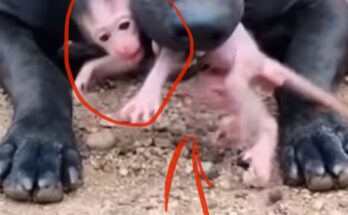In the heart of the forest, where the sun filters softly through the thick green canopy, a small tragedy unfolded — one that left even the most seasoned wildlife observers speechless. A baby monkey, no more than a few months old, lost its mother and, in a desperate attempt to follow her, slipped into a rushing river and drowned. It was a heartbreaking reminder of how fragile life in the wild can be and how deeply animals, just like humans, experience loss and fear.
The young monkey had been seen clinging tightly to its mother’s fur earlier that morning. The troop was moving across the trees in search of food, chattering and calling to each other. Suddenly, chaos erupted. A loud noise — possibly from a nearby predator or a human disturbance — startled the group. In the confusion, the mother became separated from her infant. She leapt across the branches, calling frantically, but the little one was left behind, crying helplessly.
Witnesses said the baby tried to follow, attempting to climb along a thin branch over the river below. But its small hands slipped, and within seconds, it plunged into the fast-moving water. The current was too strong, and despite struggling, the tiny monkey was swept away. The mother, hearing the cries, rushed to the riverbank, but it was too late. She remained there for hours, pacing and calling softly — an image of pure grief that was difficult to watch.
This tragic event reveals not only the harsh realities of nature but also the deep emotional bonds that animals share. Many people underestimate the intelligence and feelings of wild creatures, yet time and again, we see evidence of love, fear, and sorrow among them. A mother monkey’s attachment to her baby is profound; they spend nearly every moment together during the early months of life. Losing that connection is devastating.
Sadly, such incidents are not rare. Deforestation, noise pollution, and human interference often force animals into dangerous situations. Rivers once calm and safe for wildlife are now unpredictable due to changes in water flow caused by nearby construction and waste dumping. The baby monkey’s death is not only a personal tragedy but also a symptom of a larger problem — the constant pressure humans place on fragile ecosystems.
If there is anything to learn from this sad story, it is that every life in the wild matters. Each creature, no matter how small, plays a vital role in maintaining the balance of nature. Protecting their habitats and minimizing human disturbance can prevent countless similar tragedies from happening again.
The image of that grieving mother monkey by the river will linger in the hearts of those who witnessed it. It serves as a silent plea for compassion — a reminder that love, loss, and the will to survive are emotions shared by all living beings.



